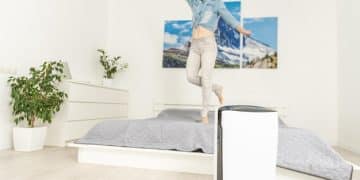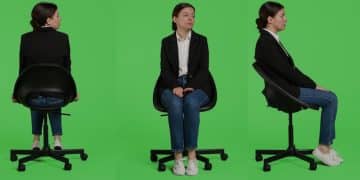The Truth About Blue Light Glasses: Do They Really Reduce Eye Strain?
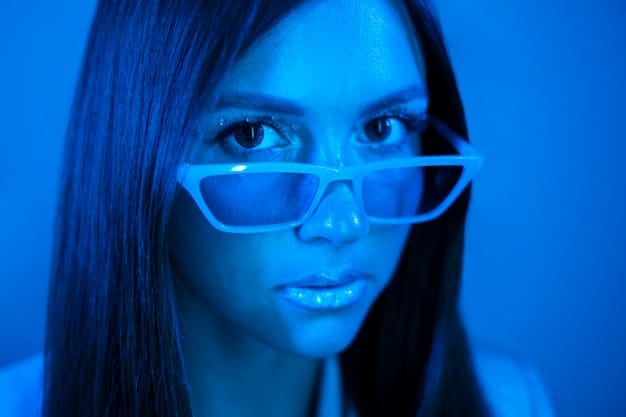
The Truth About Blue Light Glasses: Do They Really Reduce Eye Strain? A Scientific Review reveals that while blue light glasses might offer some benefits, scientific evidence supporting their effectiveness in reducing eye strain is limited.
Are you constantly staring at screens? You’ve probably heard about **The Truth About Blue Light Glasses: Do They Really Reduce Eye Strain? A Scientific Review** about these glasses designed to filter out blue light. Let’s dive into the science to see if they truly work or if it’s all just marketing hype.
Understanding Blue Light: What Is It and Where Does It Come From?
Blue light is a high-energy visible light emitted from various sources, but is it really bad for our eyes? Let’s explore what blue light is and where it comes from before assessing the potential impact on your eye health.
Sources of Blue Light
Blue light is everywhere, both indoors and outdoors. Beyond the sun, artificial sources also contribute significantly to our daily exposure.
- Sunlight: The most significant natural source of blue light.
- Digital Screens: Smartphones, tablets, computers, and TVs emit blue light.
- LED and Fluorescent Lighting: These energy-efficient lights also produce blue light.
The Electromagnetic Spectrum
Blue light falls within the visible light spectrum, characterized by short wavelengths and high energy. This energy level is what raises concerns about potential eye damage.
Understanding the electromagnetic spectrum helps provide context about where blue light fits in relation to other forms of light. It is a part of the broader spectrum that includes both visible and invisible light.
In summary, blue light is present in our environment from both natural and artificial sources. Understanding its sources and position within the electromagnetic spectrum is essential before evaluating potential health effects.
Do Blue Light Glasses Reduce Eye Strain?
The effectiveness of blue light glasses varies depending on individual factors and usage habits. Let’s examine these reasons and the science behind the claims.
What the Research Says
Scientific studies on the efficacy of blue light glasses in reducing eye strain have produced mixed results. Many studies suggest only minor benefits, while some show no significant impact compared to regular glasses.
- Limited Evidence: Some studies indicate that blue light glasses do not significantly reduce eye strain symptoms.
- Minor Benefits: Other research suggests a slight reduction in eye discomfort for some individuals.
- Inconclusive Results: There is a lack of consistent, high-quality evidence to support widespread recommendations.
Reasons for Mixed Results
Several factors contribute to the varying outcomes of scientific studies. One of the elements to consider is the variations in study design from one to another.
Variances in study design, participant characteristics, and the types of blue light glasses used can affect the results. It’s crucial to consider these variables when interpreting the evidence.
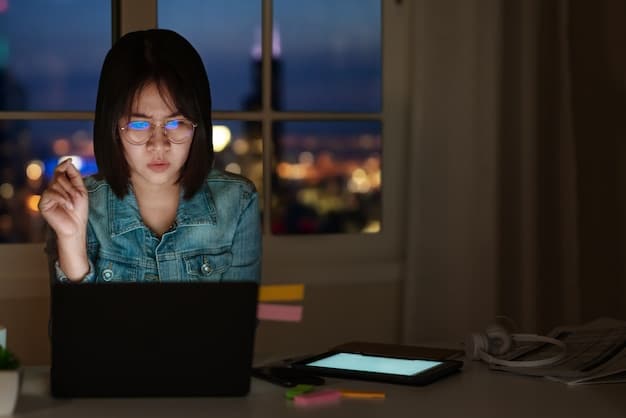
In conclusion, the impact of blue light glasses on eye strain is still under investigation. While some people may experience relief, scientific support for all claims remains limited.
The Impact of Blue Light on Sleep
Blue light’s effect on sleep has been a significant area of interest. Let’s find out how this type of light can affect your sleep patterns and quality, and what strategies can help mitigate these effects.
Melatonin Production
Blue light can suppress the production of melatonin, a hormone that regulates sleep. This suppression can disrupt your body’s natural sleep-wake cycle, making it harder to fall asleep.
Strategies to Mitigate Blue Light’s Effect on Sleep
Using blue light glasses in the evening can help reduce exposure and support better sleep. Here are a few strategies you can apply to better your sleep:
- Use Blue Light Glasses: Wear them a few hours before bedtime to filter out blue light.
- Limit Screen Time: Reduce exposure to digital screens in the evening.
- Use Night Mode: Enable night mode on devices to reduce blue light emission.
- Optimize Ambient Lighting: Use dim, warm lighting in the evening to promote melatonin production.
Blue light exposure, particularly in the evening, can interfere with melatonin production, disrupting sleep. While blue light glasses can help, combining them with other sleep hygiene practices can promote better sleep quality. A good night’s rest is crucial when it comes to keeping up with everyday activities.
Beyond Blue Light: Other Causes of Eye Strain
Eye strain can stem from various sources beyond just blue light. Addressing all potential factors is essential for comprehensive eye care and comfort. Let’s unpack some other common causes of eye strain.
Common Culprits Behind Eye Strain
If you work long hours in front of a desktop or laptop, it’s possible that you are not practicing the best habits for your eye health. Here are some other reasons why your eyes might be strained:
- Poor Lighting: Inadequate or harsh lighting can strain your eyes.
- Dry Eyes: Insufficient tear production can lead to discomfort.
- Uncorrected Vision Problems: Astigmatism, farsightedness, or nearsightedness can contribute to eye strain.
- Prolonged Screen Time: Extended periods without breaks can fatigue eye muscles.
Addressing Other Causes of Eye Strain
To relieve eye strain, you should evaluate the current lighting of your workspace. Are your eyes too dry when starting at a screen for a long time? Here are a few recommendations that you can apply.
Proper lighting, regular breaks, and addressing uncorrected vision problems can significantly reduce eye strain. It’s crucial to consider these factors alongside blue light exposure for comprehensive eye care.
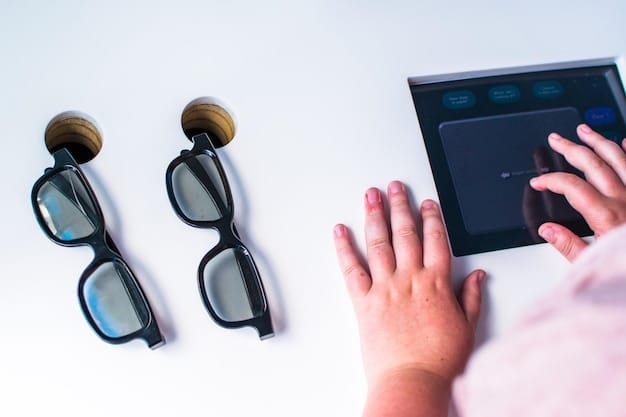
Overall, eye strain is often multifactorial, with blue light being only one component. Identifying and addressing all contributing factors is essential for effective eye care and comfort.
Choosing the Right Blue Light Glasses
Selecting the right blue light glasses involves several considerations to ensure they meet your specific needs and provide the desired benefits. By doing your research and reading labels, you can make a well-informed decision. Let’s explore how to choose the best pair.
Key Considerations When Buying
When you are looking to purchase a new pair of glasses, it is important to ask yourself questions to make an informative decision. Here are some questions to consider:
- Lens Quality: Make sure the lenses are clear and free of distortions.
- Filtration Level: Determine the percentage of blue light filtered based on your needs.
- Comfort and Fit: Choose frames that fit well and are comfortable for extended wear.
- UV Protection: Some blue light glasses also offer UV protection, adding an extra layer of defense for your eyes.
Where to Buy Blue Light Glasses
You can find blue light glasses at various retailers, both online and in physical stores. Here are a few to consider:
Selecting the right blue light glasses requires attention to lens quality, filtration level, comfort, and UV protection. Assess your needs and choose glasses from reputable sources to ensure effectiveness and quality.
Expert Opinions on Blue Light Glasses
Consulting with eye care professionals can provide valuable insights into the use and effectiveness of blue light glasses. Hearing from the experts can give you a more holistic overview of choosing the best plan of action.
What Eye Doctors Say
Many eye doctors recommend blue light glasses for patients who spend extended periods in front of digital screens. However, they also emphasize the importance of proper ergonomics and regular breaks.
Doctors often suggest that blue light glasses can be a helpful tool, but they should be complemented by other eye care practices. This can involve taking breaks and looking away from the computer screen during long hours of working. Consider asking your doctor about what they think might be best for you.
Seeking expert advice can help you make an informed decision about using blue light glasses. By consulting with an eye doctor, you can gain personalized recommendations tailored to your specific needs and lifestyle.
| Key Point | Brief Description |
|---|---|
| ☀️ Blue Light Sources | Sunlight, digital screens, and LED lighting emit blue light. |
| 👓 Reduced Eye Strain | Research results vary; benefits may be minor. |
| 🌙 Sleep Impact | Blue light can suppress melatonin, disrupting sleep. |
| 👁️ Other Causes | Poor lighting, dry eyes, and vision problems strain eyes. |
Frequently Asked Questions About Blue Light Glasses
▼
Blue light glasses can be useful for children, especially those who spend significant time using digital devices. However, consult with a pediatrician or eye doctor to assess their specific needs and usage habits.
▼
To clean blue light glasses, use a microfiber cloth and a lens cleaning solution. Avoid using paper towels or harsh chemicals, as they can scratch the lenses. Gently wipe both sides of the lenses to remove dirt and smudges.
▼
While some studies suggest blue light may contribute to macular degeneration, there is no conclusive evidence that blue light glasses can prevent it. Consult your eye doctor about the risk factors and preventive measures for macular degeneration.
▼
Wearing blue light glasses all day is generally safe. However, if you experience any discomfort or vision changes, consult an eye care professional. Additionally, consider whether you need them when not using digital devices.
▼
Blue light screen protectors can offer some blue light filtration, but their effectiveness may vary. They are generally less effective than wearing blue light glasses, as they only protect your eyes from the screen they are adhered to.
Conclusion
In conclusion, while blue light glasses may offer some potential benefits, the scientific evidence supporting their effectiveness in reducing eye strain and improving sleep is still limited. It’s essential to weigh the benefits along with other eye care practices when considering blue light glasses.


